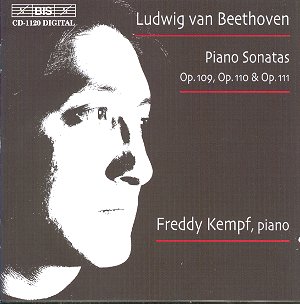This disc and its Chopin companion
are both fastidiously played. For all this these are a young man’s first
recordings of repertoire to which he will return with greater insight
in future years.
The Beethoven sonatas are perhaps the finer recordings.
Already in the Op.109 there is a directness to Kempf’s playing and more
importantly an understanding of the complex rhythms to the first movement:
accents are clearly differentiated in an intelligent way. Nowhere better
does he find the right mood and right displacement of note values than
in the adagio which here seems dramatic in its sense of scale. The prestissimo
has considerable pace, and there is a magical moment at bar 83 where
the una corda effects seem as softly played as floating clouds.
If technique is more important in Op.109 than in Op.110 the latter requires
more mystery. Kempf uses minimal rubato in the first movement, and for
this reason the movement has a sensitivity to phrasing and dynamics
which lightens the textures. Touch and tone remain beautifully painted
– and his pedalling never seems to interfere with the staccato passages.
The playing actually moves on inexorably – but there is, as ever with
Kempf, a delicacy to what his right or left hand is doing which means
a single note or phrase registered piano actually plays that
way (the opening of bar 21, for example).
The Op.111 is the most difficult of the late sonatas
and if Kempf has the technique for it he sometimes displays a less than
sure sense of direction. In the Arietta, for example, Kempf’s
tone can sometimes sound louder than Beethoven’s intention which was
surely almost to muffle it. Having said that, his tempi are almost ideal:
the well sustained opening to the Maestoso, with finely projected rhythm,
is sharply focussed and his arpeggios have thrilling immediacy and impact.
The allegro con brio is almost ideally timed – not too fast,
and with just the right degree of fusion to give a polyphonic radiance
beyond the notes.
Never less than fascinating this disc shows a young
tiger with an absolute command of the keyboard. There are sublime touches
and Kempf has an unerring ability to strike beauty from the piano. Do
hear this disc but don’t assume that it is the last word on Beethoven
– or Kempf.
Marc Bridle
Interview
with Freddy Kempf


